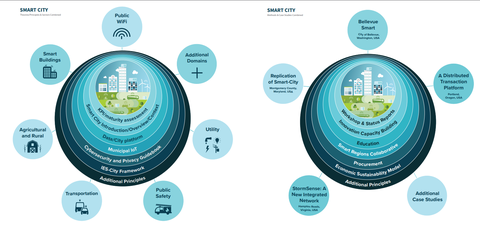NIST Smart Cities and Communities Framework Series

Smart Cities and Communities Framework Structure
Background: When considering smart technologies, cities and communities seek best practices for achieving standards-based solutions that are replicable, scalable and readily adoptable.
Goal: The NIST Smart Cities and Communities Framework (SCCF) series will provide cities and communities with best practices and technical guidelines for the planning, developing and implementing smart solutions. Industry stakeholders and the research community can use the NIST SCCF as a reference to further their innovation and product development goals, and to improve the quality of service. The target audience includes city and community officials, technology innovators, researchers, project planners and managers, and other implementers.
Smart Cities and Communities Framework Series: Through the Global City Teams Challenge (GCTC), NIST collected a large amount of information on best practices in the field of smart cities and communities. The NIST SCCF series consolidates and organizes this information, as well as, continues to build additional frameworks for new emerging topics in smart cities and communities. The NIST SCCF series addresses theoretical and practical aspects of smart cities and community development. The series also includes best practices, ranging from issues cutting across all aspects of smart cities and communities, to those applicable for establishing smart sectors, such as smart transportation. Additionally, the series includes methods and case studies.
Smart Cities and Communities Framework Series' Four Categories: NIST SCCF publications are categorized to facilitate reference and use. The following publications, in these categories, reflect those currently available, or planned. Additional publications will be developed to address issues as they emerge. The following list summarizes the current pipeline. Each publication is in a different stage of development.
Category 1: Cross-cutting and Foundational Issues: This category addresses issues impacting all aspects of smart cities and communities’ development, such as data, platforms, key performance indicators, municipal IoT, cybersecurity and privacy. The current pipeline includes the following (in no specific order):
- Smart City Introduction/Overview/Context
- IES-City Framework
- Cybersecurity and Privacy Guidebook (CPAC)
- Data/City platform
- Wireless - Municipal IoT
- Smart Cities and Communities: A Key Performance Indicators Framework
Category 2: Sector-specific Issues: This category addresses smart city and community services, such as smart transportation. The current pipeline includes the following (in no specific order):
- Transportation
- Public Safety
- Utility
- Wireless - Public WiFi
- Agriculture and Rural
- Smart Buildings
Category 3: Implementation, Methods, and Approaches: This category provides publications addressing collaboration, innovation capacity building, education, procurement, economic sustainability and more. The current pipeline includes the following (in no specific order):
- Catalyzing the Internet of Things and Smart Cities: Global City Teams Challenge
- Facilitation of Smart City and Community Technology Convergence
- Global City Teams Challenge 2016 Update
- Workshop report: Global City Teams Challenge 2018 Kickoff and IES-City Framework Workshop
- 2019 GCTC/SC3 Expo report
- Public Safety/Cybersecurity Status report
- Innovation capacity building
- Education
- Smart Regions Collaborative
- Procurement
- Economic sustainability model
Category 4: Case Studies: While publications in other categories may include case studies, those in this fourth category exclusively address case studies, providing detailed analysis. The current pipeline includes the following (in no specific order):
- Replication of Smart-City, Internet of Things Assets in a Municipal Deployment (Montgomery Count, Maryland, USA)
- StormSense: A New Integrated Network of IoT Water Level Sensors in the Smart Cities of Hampton Roads, VA (Cities of Newport and Virginia Beach, Virginia, USA)
- Bellevue Smart – Development and Integration of a Smart City Portal (City of Bellevue, Washington, USA)
- A Distributed Transaction Platform for Smart Cities (City of Portland, Oregon, USA)
NIST will continue to identify gaps and add topics as appropriate. It is expected that new subjects will be added whenever a missing link is identified through the consensus of stakeholders. This bottom-up process will encourage stakeholder engagement and ensure the selected topics are directly relevant to the needs of stakeholders and users.
Further Information and How to Get Involved: For additional information, contact Dr. Michael Dunaway (michael.dunaway [at] nist.gov (michael[dot]dunaway[at]nist[dot]gov)), Associate Director, Cyber-Physical Systems Innovation.

